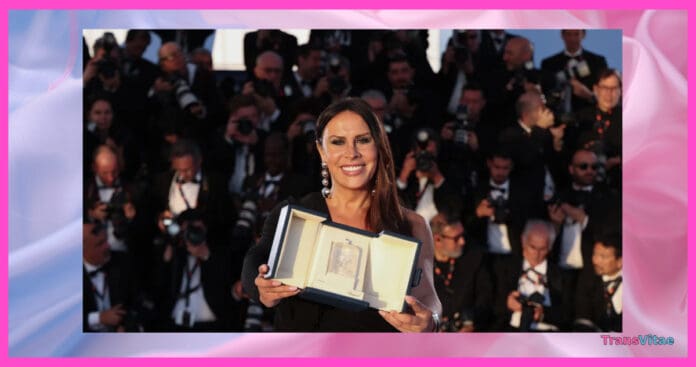In a groundbreaking moment at the Cannes Film Festival, Spanish actor Karla Sofia Gascon made history as the first transgender woman to be awarded Best Actress. Gascon, 52, received the accolade alongside her co-stars for their performances in Jacques Audiard’s film Emilia Perez. This dazzling narco musical captivated audiences and critics alike, not only for its cinematic brilliance but also for its bold exploration of identity and transformation.
Gascon’s role as a Mexican drug trafficker who undergoes gender reassignment surgery is a poignant reflection of her own journey. Having lived as a man until she was 46, her portrayal in Emilia Perez is both personal and powerful. Her acceptance speech was a heartfelt tribute to the transgender community, dedicating her win to “all the trans people who are suffering” and calling for an end to harmful labels.
However, Gascon’s victory was not without controversy. French far-right politician Marion Marechal took to social media to express her disdain, posting on X (formerly Twitter), “So a man has won Best Actress. Progress for the left means the erasure of women and mothers.” This inflammatory remark sparked outrage and led to Gascon filing a legal complaint for “sexist insult on the basis of gender identity” through her lawyer, Etienne Deshoulieres.
Gascon’s response to Marechal’s comment was firm and clear: “We need to stop such comments.” Her legal action is not just a personal defense but also a protest against the widespread discrimination transgender people experience. The lawsuit highlights the ongoing battle for acceptance and respect in a world where transgender people are still fighting for their basic rights.
A Voice for the Transgender Community
During the festival, Gascon used her platform to address the prejudices faced by transgender people. She emphasized that being trans should not define a person, stating, “Once they have transitioned, that’s it. They are what they are.” Her role in Emilia Perez and her public statements challenge the societal norms that continue to marginalize transgender individuals.
Gascon’s victory and subsequent legal action resonate deeply within the transgender community and beyond. It underscores the importance of representation and the impact of standing up against bigotry. Her courage in the face of adversity is a beacon of hope for many who are struggling with their own journeys.
Emilia Perez has been praised not only for its narrative but also for its nuanced approach to transgender issues. Rather than fixating on the transition itself, the film explores broader themes of family, love, and the victims of Mexico’s gang violence. This approach allows for a more comprehensive understanding of the characters and their experiences, moving beyond stereotypes and offering a richer, more empathetic portrayal.
Critics have lauded the film for its innovative storytelling and the performances of its cast, including Selena Gomez, Zoe Saldaña, and Adriana Paz. Gascon’s portrayal of a drug lord navigating life before and after transition has been particularly acclaimed, earning the film the longest-standing ovation of the festival.
Gascon’s win at Cannes and her subsequent legal battle highlight the broader issues faced by the transgender community. Transgender individuals often endure significant hardships, including discrimination, harassment, and violence. In many countries, including Mexico, where Gascon is from, transgender people are frequently subjected to derogatory treatment and threats.
These experiences take a severe toll on mental health. Gender dysphoria, a condition where there is a conflict between a person’s physical gender and the gender with which they identify, can lead to profound emotional and psychological distress. The societal stigma associated with being transgender exacerbates these challenges, often leading to anxiety, depression, and other mental health issues.
Gascon’s achievement and her proactive stance against transphobia are crucial in fostering a more inclusive and accepting society. Representation in media and film plays a vital role in shaping public perceptions and attitudes. When transgender individuals see themselves represented positively and authentically, it validates their experiences and contributes to a sense of belonging and acceptance.
Moreover, support from organizations and allies is essential. In response to Marechal’s comments, six European LGBTQ+ groups filed a complaint against her for using “transphobic insults.” This collective action demonstrates solidarity and the importance of standing together against hate speech and discrimination.
A Message of Hope
Despite the challenges, Gascon’s story is ultimately one of resilience and hope. Her success at Cannes is a testament to her talent and determination, and her advocacy work is a powerful reminder of the ongoing fight for transgender rights. She encourages transgender individuals to remain hopeful and to continue believing in the possibility of positive change.
In her acceptance speech, Gascon said, “Tomorrow, there will be plenty of comments from terrible people saying the same things about all of us trans people. But I want to end with a message of hope. To all of them, like Emilia Perez, we all have the opportunity to change for the better, to become better people. If you have made us suffer, it is time for you also to change.”
The Bottom Line
Karla Sofia Gascon’s historic win at the Cannes Film Festival and her subsequent legal action against transphobic remarks are significant milestones in the ongoing struggle for transgender rights. Her story is a powerful reminder of the importance of representation, resilience, and the fight against discrimination. For transgender individuals, their families, and allies, Gascon’s achievements offer hope and inspiration, proving that change is possible and that every step forward, no matter how challenging, is a victory worth celebrating.


